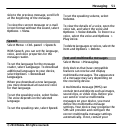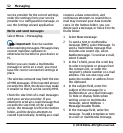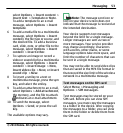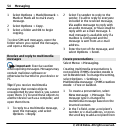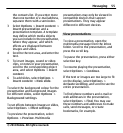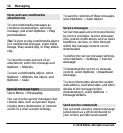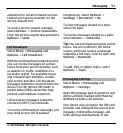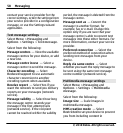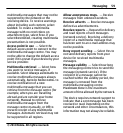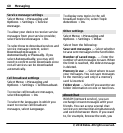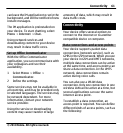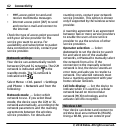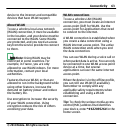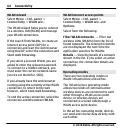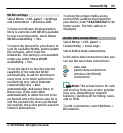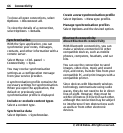
multimedia messages that may not be
supported by the network or the
receiving device. To receive warnings
about including such content, select
Guided. To create a multimedia
message with no restrictions on
attachment type, select Free. If you
select Restricted, creating multimedia
presentations is not possible.
Access point in use — Select the
default access point to connect to the
multimedia message centre. You may
not be able to change the default access
point if it is preset in your device by your
service provider.
Multimedia retrieval — Select how
you want to receive messages, if
available. Select Always automatic to
receive multimedia messages always
automatically, Auto in home netw. to
receive notification of a new
multimedia message that you can
retrieve from the message centre (for
example, when you are travelling
abroad and are outside your home
network), Manual to retrieve
multimedia messages from the
message centre manually, or Off to
prevent receipt of any multimedia
messages. Automatic retrieval may not
be supported in all regions.
Allow anonymous msgs. — Receive
messages from unknown senders.
Receive adverts — Receive messages
defined as advertisements.
Receive reports — Request for delivery
and read reports of sent messages
(network service). Receiving a delivery
report of a multimedia message that
has been sent to an e-mail address may
not be possible.
Deny report sending — Select Yes to
not send delivery reports from your
device for received multimedia
messages.
Message validity — Select how long
the messaging centre tries to send the
message (network service). If the
recipient of a message cannot be
reached within the validity period, the
message is removed from the
multimedia messaging centre.
Maximum time is the maximum
amount of time allowed by the network.
The device requires network support to
indicate that a sent message has been
received or read. Depending on the
network and other circumstances, this
information may not always be reliable.
Messaging 59
© 2010 Nokia. All rights reserved.



